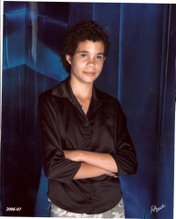She left a comment on my earlier post saying she'd posted about a "granny" today. She sure had. She wrote about her husband's grandmother, born in 1870 in England. (Wystful, I think I have that part right). Amazing woman.
Then she printed a narrative poem. Nothing unusual about that except it was the exact poem my own maternal grandmother used to recite to me when I was small. A three handkerchief rendition and I loved it.
She was a country schoolteacher before she left to marry, move to a farm, and raise five children. I always thought she learned it as a schoolgirl or taught it to her one-room class but evidently the poem was written in 1887 so I'm not sure. My mom was born in 1912, the youngest of the brood so possibly my grandmother took her love of reading back to the farm when she left teaching and learned it there. I know she loved poetry and had several books she shared with me.
It's one of those pieces kids back then memorized to recite for special occasions; the more dramatic the better and my grandmother pulled out all the stops for me. We spent at least every Sunday on the farm and I'd ask for two things. (Three - I almost forgot the homemade ice cream - from our own cows - with chocolate syrup). First, the poem and then the piano. I've written before that she taught me to play from old church hymnals and I can't remember when I learned to read music. Probably about the same time I learned to read words.
I memorized that poem but I could never do it as well as she did. I've been looking for it ever since in old poetry anthologies with no luck. Never occurred to me to look online and of course there it was along with biographies of the poet.
We don't memorize (or even read much) poetry anymore and I think we've lost something. Not that this poet is up there with Yeats and Keats but she was very well known in her time. She wrote two narrative poems; this one is the better known. She wrote children's stories and articles for the Ladies' Home Journal.
Here's the poem courtesy of Women's History. Corny? Probably, but I'd like to think there's still room for drama and heroines today. I had tears in my eyes, which doesn't happen too often, the minute I read the first line on Wystful's post. Partly because of Bess, the heroine, and partly because after all these years I still think of my own amazing grandma who gave me so much.
Thanks Wystful1. You made my day without even knowing it. The internet can be a glorious place.
CURFEW MUST NOT RING TONIGHT
by Rose Hartwick Thorpe (1850-1939)Slowly England's sun was setting oe'r the hilltops far away,
Filling all the land with beauty at the close of one sad day;
And its last rays kissed the forehead of a man and maiden fair,--
He with steps so slow and weary; she with sunny, floating hair;
He with bowed head, sad and thoughtful, she, with lips all cold and white,
Struggling to keep back the murmur, "Curfew must not ring to-night!""Sexton," Bessie's white lips faltered, pointing to the prison old,
With its walls tall and gloomy, moss-grown walls dark, damp and cold,--
"I've a lover in the prison, doomed this very night to die
At the ringing of the curfew, and no earthly help is nigh.
Cromwell will not come till sunset;" and her lips grew strangely white,
As she spoke in husky whispers, "Curfew must not ring to-night!""Bessie," calmly spoke the sexton (every word pierced her young heart
Like a gleaming death-winged arrow, like a deadly poisoned dart),
"Long, long years I've rung the curfew from that gloomy, shadowed tower;
Every evening, just at sunset, it has tolled the twilight hour.
I have done my duty ever, tried to do it just and right:
Now I'm old, I will not miss it. Curfew bell must ring to-night!"Wild her eyes and pale her features, stern and white her thoughtful brow,
As within her secret bosom, Bessie made a solemn vow.
She had listened while the judges read, without a tear or sigh,
"At the ringing of the curfew, Basil Underwood must "die.
And her breath came fast and faster, and her eyes grew large and bright;
One low murmur, faintly spoken. "Curfew must not ring to-night!"She with quick step bounded forward, sprang within the old church-door,
Left the old man coming slowly, paths he'd trod so oft before.
Not one moment paused the maiden, But with eye and cheek aglow,
Staggered up the gloomy tower, Where the bell swung to and fro;
As she climbed the slimy ladder, On which fell no ray of light,
Upward still, her pale lips saying, "Curfew shall not ring to-night!"She has reached the topmost ladder, o'er her hangs the great dark bell;
Awful is the gloom beneath her, like the pathway down to hell.
See! the ponderous tongue is swinging; 'tis the hour of curfew now,
And the sight has chilled her bosom, stopped her breath, and paled her brow.
Shall she let it ring? No, never! Her eyes flash with sudden light,
As she springs, and grasps it firmly: "Curfew shall not ring to-night!"Out she swung,-- far out. The city Seemed a speck of light below,--
There twixt heaven and earth suspended, As the bell swung to and fro.
And the sexton at the bell-rope, old and deaf, heard not the bell,
Sadly thought that twilight curfew rang young Basil's funeral knell.
"Still the maiden, clinging firmly, quivering lip and fair face white,
Stilled her frightened heart's wild throbbing: "Curfew shall not ring tonight!"It was o'er, the bell ceased swaying; and the maiden stepped once more
Firmly on the damp old ladder, where, for hundred years before,
Human foot had not been planted. The brave deed that she had done
Should be told long ages after. As the rays of setting sun
Light the sky with golden beauty, aged sires, with heads of white,
Tell the children why the curfew did not ring that one sad night.O'er the distant hills comes Cromwell. Bessie sees him; and her brow,
Lately white with sickening horror, has no anxious traces now.
At his feet she tells her story, shows her hands, all bruised and torn;
And her sweet young face, still hagggard, with the anguish it had worn,
Touched his heart with sudden pity, lit his eyes with misty light.
"Go! your lover lives," said Cromwell. "Curfew shall not ring to-night!"Wide they flung the massive portals, led the prisoner forth to die,
All his bright young life before him. Neath the darkening English sky,
Bessie came, with flying footsteps, eyes aglow with lovelight sweet;
Kneeling on the turf beside him, laid his pardon at his feet.
In his brave, strong arms he clasped her, kissed the face upturned and white,
Whispered, "Darling, you have saved me, curfew will not ring to-night."
*From Ringing ballads, including Curfew must not ring tonight, Rose Hartwick Thorpe, 1887










16 comments:
Oh, my goodness. If that isn't a poem for Anne Shirley to recite I don't know what is.
i love poetry - it's subtle music. and i agree with you about memorization. i think it's a great loss. once had a visiting Scottish lass stop over in a cabin i lived in on the Yukon river, miles from anyone. she entertained us all night with poems and stories she knew by memory. it's a dying art. Contrary to popular practice, i still make my violin students memorise their music. i tell them they've only begun to learn how to play it when they know all the notes.
We think it's a big world out there but then something happens to make you realize what a small world it is after all! How wonderful that you found this lady's blog and saw that very same poem your gran used to read to you and that you had memorized. I remember having to memorize such stories and poems and you're right, it seems to be a lost art nowadays!!
I just met Wystful1 myself and went by there today...I loved the post!! I read how it affected you...I think everyone that goes by will be in some way or another, to me it was a very moving poem...I would love to hear Horizon recite it and have sent it to her!
(((hugs)))
what a beautiful poem. I'd read it before...love it. :)
Another favorite of mine is "The Highwayman"
"The highwayman came riding, riding, the highwayman came riding, up to the old inn door."
Love those old narratives.
kendra
lovely poem indeed Ann..
I'm trying to visit as many of the NaBloPoMo blogs as I can and I thought I'd say hi, I liked your blog.. :) I will drop back at the end of the month and see how you all go with the blogging ;)
This is a lovely poem. I can tell you have such special memories of your Grandma. Mine was a huge influence on my life as well. I'm trying to get caught up on reading blogs. It's amazing what being away for a few days can put into bloglines, isn't it?
It's pouring here today..quite a change from sunny and warm LA!
Hi Ann, that's a great poem I will have to run it in Poetry Galore sometime.
That's a great poem, Ann. I'll have to save it and add it to my poem collection.
Take care, Meow
Wow - I guess it is just us older folks now that recite poems and stories. I remember when I was younger we even had to memorize poems in school. Now a days the kids can recite songs which is a sort of poetry even if they don't know it. So glad you found the poem of your childhood.
*smiles hugely* What a great post (hubby's grandmother was born in 1890...you're close! hehehehe)
Ann, you've done yourself proud with this post, truly!!
I again, got tearful re-reading it. I still can picture myself sitting down to listen to her recite this and when she was done, I was speechless!!
Thanks for linking me. Glad, really glad we "connected" yesterday.
just popping round to say HI
Had never read that before - it was great! Our children are much the poorer for not being exposed to such as this today. ec
You're always on top of everyone and their goings on! And might I say... that was a LONG post!
James Thurber did an illustrated version of this poem, in his odd pen-and-ink drawings. You can see it in his collection, "The Thurber Carnival."
That`s what I know it from.
Post a Comment